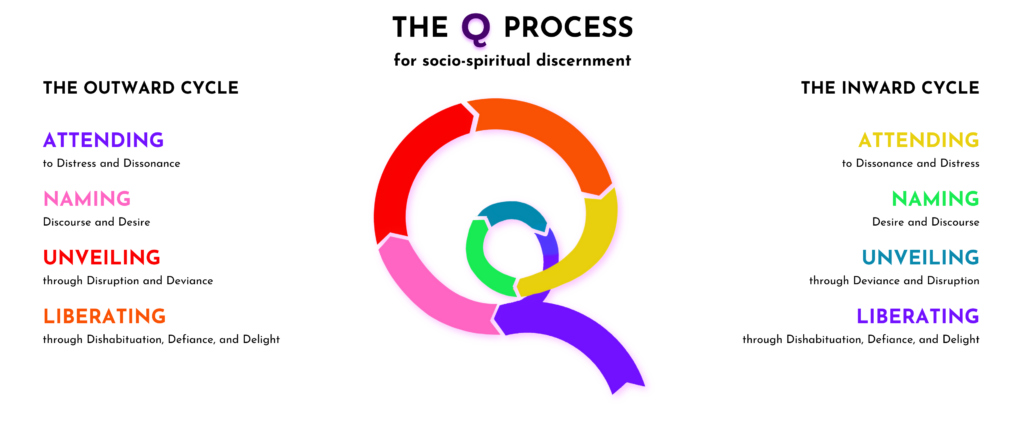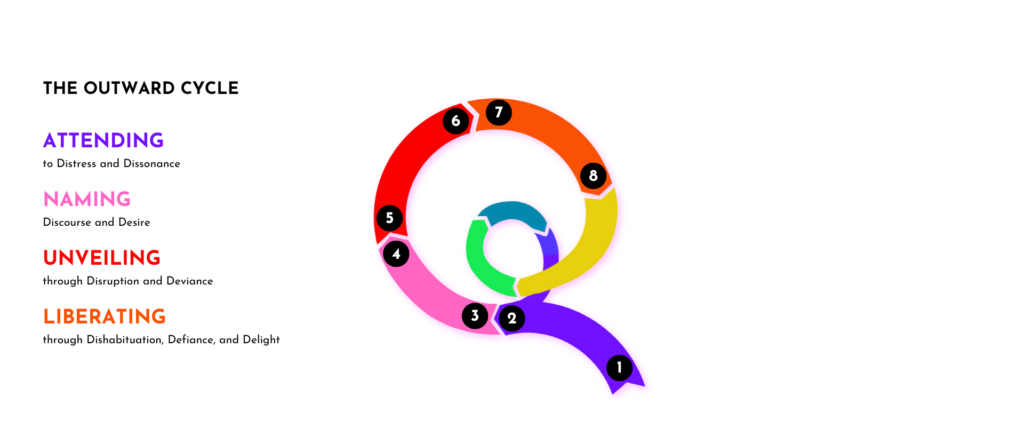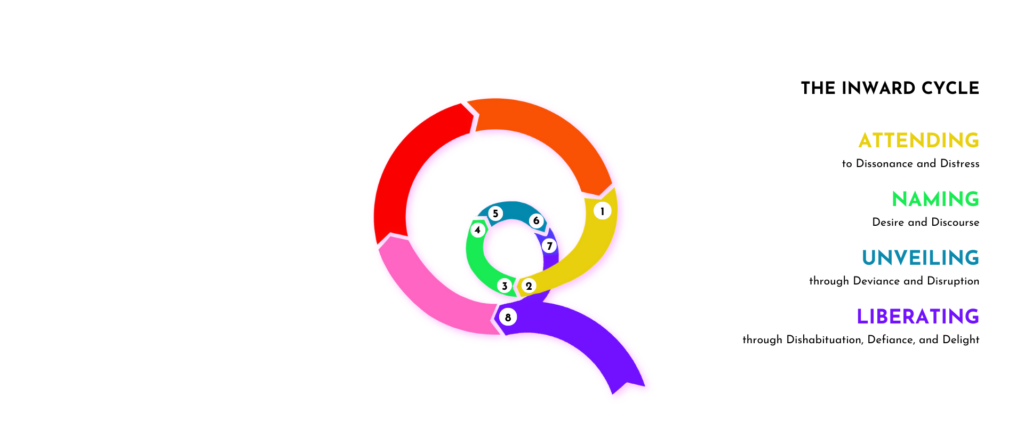
We offer in-person and virtual trainings for groups and organizations wishing to use this process in their spaces. For more information, contact us here.
Background:
“Socio-Spiritual Discernment” is a way for participants to examine and challenge the toxic norms, assumptions, and beliefs that have taken root in their own consciousness, as well as confront the way they find expression in oppressive societal systems.
This process is about more than confrontation; is about nurturing healing and liberation for ourselves as we become more able to “show up” for the ongoing work of social transformation.
There are four primary movements in this process: attending, naming, unveiling, and liberating, engaged both inward and outward.
This movement from inner to outer, personal to social, is continuous. Recursive. Our inner work continually reflects outward; the outer work continually shapes our own consciousness. As we attend to the ways oppression malforms our own imaginations we find ourselves better able to confront oppressive social systems around us. And, as we attend to those crushed by these social systems, and analyze those systems, we are better able to nurture inner healing and growth.
___
Note: This process reflects the research and work of Maki Ashe Van Steenwyk, bringing together insights from her graduate research into queer theory, liberation theology/philosophy, socio-cultural analysis, mysticism, critical pedagogy, contemplative psychology, radical political process, and more…to offer a unique approach to understanding social oppression through a spiritual lens (and spirituality through a political lens). Though it employs a queer lens, this doesn’t mean the process is particularly for queer people. In fact, this process is incredibly useful for folks with dominant or privileged identities and social locations.

- The Spirit of Liberation dances in the space between us, subverting alienation and oppression, opening possibilities where none would otherwise seem possible. The Spirit of Liberation invites us to bring our fullness into the ongoing work of co-creating a new world. Rest in these truths.
- Give compassionate attention to those in distress, struggling, or suffering.
- Name an injustice or social problem you’ve noticed. Ask questions like: “Who ‘benefits’ from this?” and “Who is most harmed by this?” and “How did it become a problem?” etc.
- What social norms, narratives, or habits (hardened processes/policies/etc.) have concealed, obscured, minimized, or normalized what you’ve noticed? What else is concealed, obscured, etc. by these norms, narratives, or habits?
- Pinpoint a poignant and/or concrete expression of the problem. What is the crux of the problem? How is that most clearly expressed? What shape or form does it take? How does it work?
- Plan an action or strategy that engages this expression of the problem. Anchor your planning, as much as you are able, in the experiences and insights of those most harmed by this expression. And, at the same time, give an honest accounting of the norms, narratives, habits, and history animating this expression. “Perform” your action or strategy (as a group if possible).
- Explore the implications and consequences of your action. Ask questions like: “How did this process go?” or “How might this create space or opportunity for deeper action? Or for something new?” or “What did this action provoke within us?” etc.
- If you are able, commit to a generative habit, practice, or relationship that counters the problematic norms, narratives, or habits explored earlier. Celebrate the ways you’ve experienced liberation and life in this process.

- The Spirit of Liberation dances in the space between us, subverting alienation and oppression, opening possibilities where none would otherwise seem possible. The Spirit of Liberation invites us to bring our fullness into the ongoing work of co-creating a new world. Rest in these truths.
- Give compassionate attention to your inner dissonance, to your struggles, and to the ways you feel out of sync with the world around you.
- Name any harmful or unhelpful habits, assumptions, or beliefs that fuel that dissonance/struggle.
- Detail the norms, narratives, and habits that “naturalize” those habits, assumptions, or beliefs. Ask “what do these things conceal or obscure about me?” Ask “what longings or desires are hidden under this?”
- Pinpoint one or two concrete ways that these habits, assumptions, or beliefs show up in your life. What shape or form do they take? How do they shape your relationships with yourself? With others? With the more-than-human world?
- Plan an action or strategy that engages this concrete expression. “Perform” your action or strategy, with the support of others if possible.
- Explore the implications and consequences of your action. Ask questions like: “How did this process go?” or “How might this create space or opportunity for deeper action? Or for something new?” or “What did this action provoke within me?” etc.
- If you are able, commit to a generative habit, practice, or relationship that counters the problematic habits, assumptions, or beliefs, explored earlier. Celebrate the ways you’ve experienced liberation and life in this process.
Begin again. ∞
How we use the Q process:
We are able to adapt this process for various groups and use aspects of this process in workshops, courses, retreats, and materials.
However, the most immersive way to engage in this process is to invite us to guide your group through three separate phases. Here’s one example of how that could look:
Phase One, Inner: We offer a weekend retreat to your group. In the retreat, participants will learn about the ways we are shaped by oppressive social systems, how they are “normalized” or “naturalized” by myths, and how they constrain our own deep humanity. The retreat will bring together contemplative practice, social analysis, and group exercises. By articulating and confronting these myths, we begin to experience inner healing.
Phase Two, Outer: We will schedule a series of eight meetings, either in person or via video conferencing to work through the outer cycle. Typically, the emphasis here is on a broader social context or society in general. However, an organization or group might focus on their own organization or group as a collective social system. As we recognize that the same myths that ensnare our own imaginations are active in and through unjust social structures, we can begin to confront those structures as part of our own work of liberation. This is, fundamentally, a prophetic task.
Part Three, Ongoing: We will equip participants with resources for ongoing, recursive, work—both as individuals, and as a group. The Q Process is, at it’s core, a tool for discernment that opens up increasing opportunities for liberatory personal, interpersonal, and social action. The nature of that discernment and the shape of that action varies, and so we will discern with you what resources are helpful as you continue.
If you’d like to invite us to present this process to your group, contact us.
